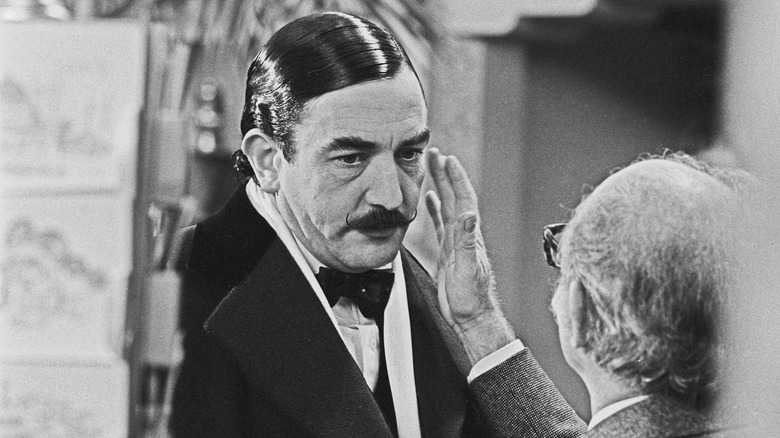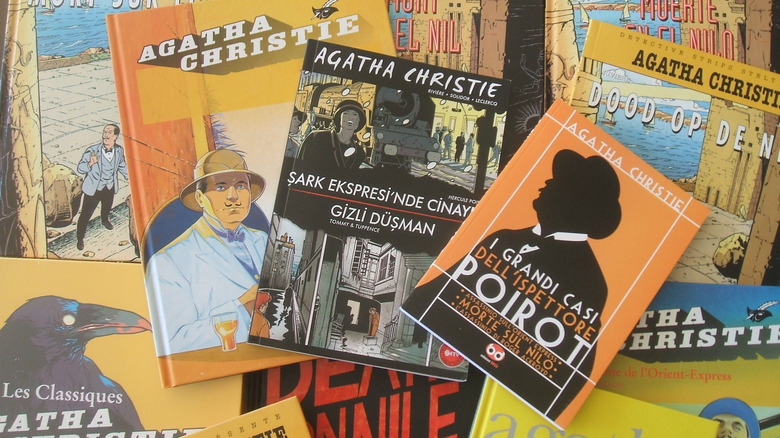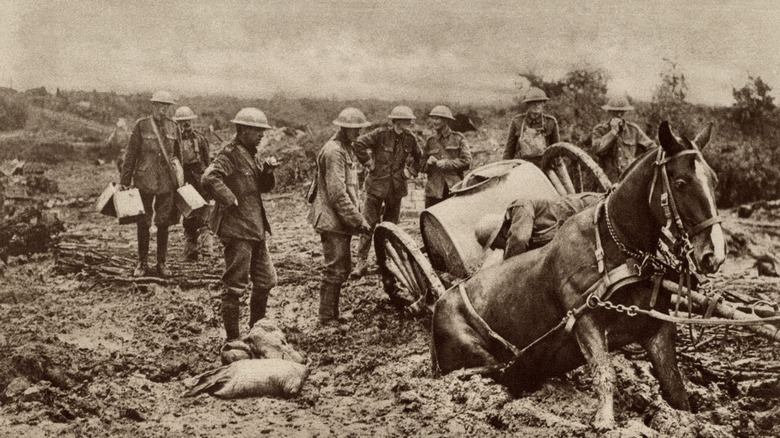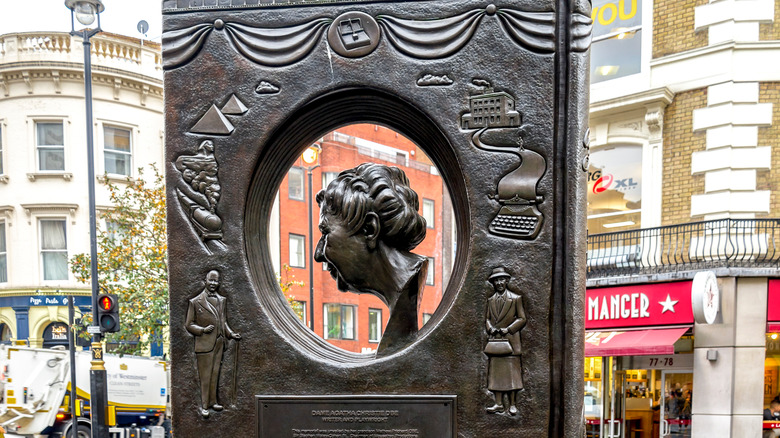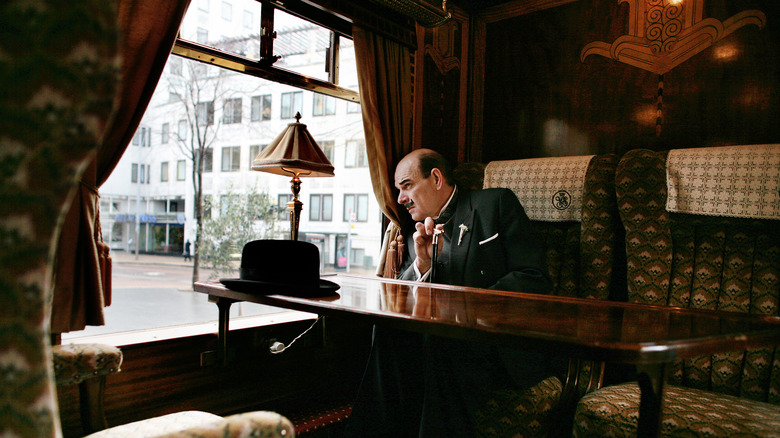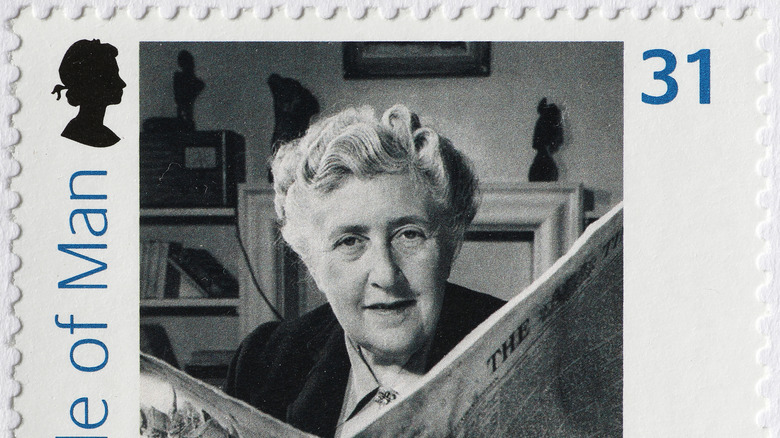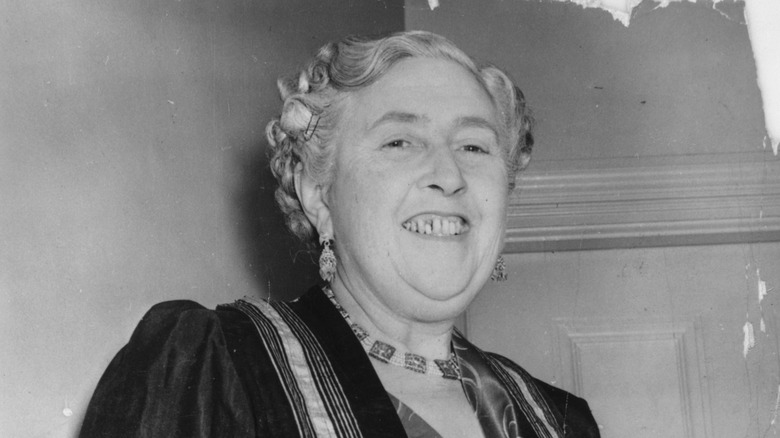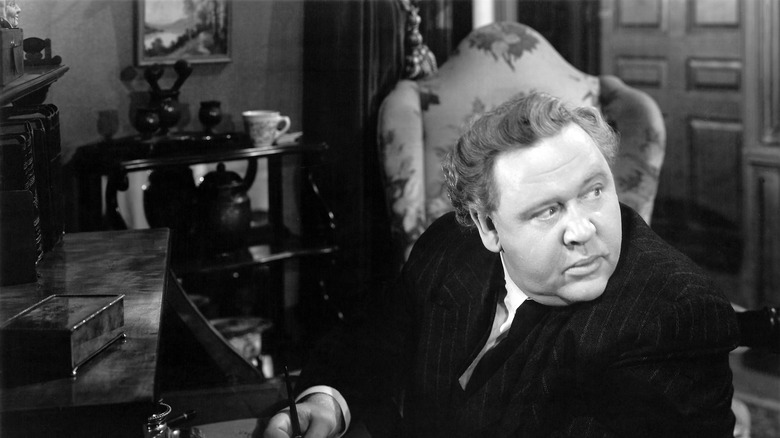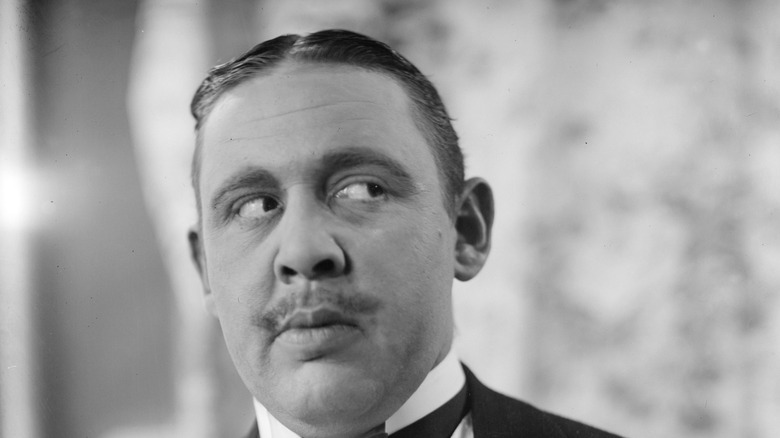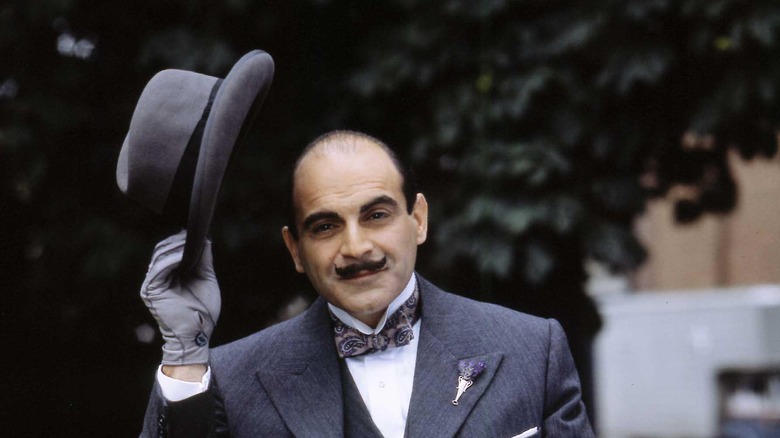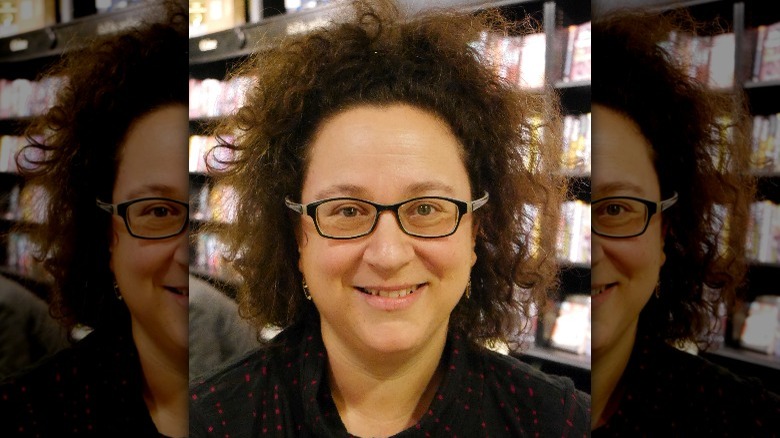The Untold Truth Of Hercule Poirot
Hercule Poirot is the greatest of Agatha Christie's creations — a Belgian detective who assists with English mysteries in the period of time between the world wars. Best known for his psychological approach to solving a crime or mystery, Poirot is probably best matched in literature by detectives Sherlock Holmes and Nancy Drew.
Christie's Poirot novels were outrageously popular, leading to Poirot as the first fictional character to receive an obituary in the New York Times. Though Christie was eventually tired of writing him, his stories were what the public wanted to read, and so she obliged; Poirot first appeared in her 1920 debut, and the character died in the 1975 novel "Curtain."
Poirot has also led a long life on stage and screen, both large and small. Actor David Suchet played him on television for over 25 years, for example. More recently, director and actor Kenneth Branagh has picked up the role on the larger film screen. Overall, Agatha Christie's Hercule Poirot has become — and remained — a valuable fixture of the mystery and detective literary canon.
Hercule Poirot made his first appearance in Agatha Christie's debut
In 1916, Agatha Christie wrote a novel called "The Mysterious Affair at Styles," as per the Kalamazoo Public Library. It was finally published in 1920 and featured Hercule Poirot as an old friend brought in to investigate an English poisoning.
"Mysterious Affair" was Christie's first novel, written after her sister Madge challenged her to write a story on a dare, writes Agatha Christie Limited. Christie was educated at home and was working as a nurse in the Torquay hospital dispensary during World War I when she wrote it.
The novel first introduces Poirot, considered egotistical and eccentric by Britannica. He would go on to be one of her most-beloved characters. The novel concerns a man named Hastings, who is injured during his time in the war and is invited to recuperate at the beautiful Styles Court. One of his hosts, Mrs. Inglethorp, is found poisoned, a murder choice used because of Christie's work as a nurse at the time.
One concept Christie attempted with this novel was that Poirot was given all the same clues as the reader, so that hopefully the reader would not solve the mystery before the character did. Despite being her first novel, the New York Times considered that Christie nevertheless "betrays the cunning of an old hand" (via Agatha Christie Limited).
Agatha Christie wrote about him the most
Hercule Poirot has been featured in 33 novels, one full-length play, and over 50 short stories by Agatha Christie, notes Agatha Christie Limited. Three of her most well-beloved novels — "Murder on the Orient Express," "The Murder of Roger Ackroyd," and "Death on the Nile" — were major vehicles for the detective, with "Roger Ackroyd" the novel that launched her to fame. It's eventual stage adaptation, "Alibi," also inspired Christie to write her own stage play, called "Black Coffee," in 1930.
In the last century, there have been over 50 Agatha Christie film adaptations, writes Novel Suspects. As might be suspected, most of them are Hercule Poirot stories. However, there are also two films that were originally Poirot stories, but which now feature her other recurring character, Miss Marple, instead: 1963's "Murder at the Gallop" and 1964's "Murder Most Foul."
In a 1930s essay on detective fiction, Christie wrote that she enjoyed making a career of writing "who dun it" books, likening the "austerity and stern discipline that goes to making a 'tight' detective plot ... good for one's thought processes." But she also warned against creating central characters, as they might be around for a "very long time."
Agatha Christie based his character on her WWI experiences
Agatha Christie based Hercule Poirot, at least in part, on Belgian refugees she had seen during World War I, writes Britannica. Due to Belgium's occupation by Germany during the war, the English were sympathetic to the Belgians, which explained why Christie could write a Belgian detective who kept getting mixed up with English mysteries and cases.
During World War I, Germany invaded Belgium to avoid France's fortresses in the areas of Verdun and Belfort, according to International Encyclopedia of the First World War. Many Belgian citizens fled to the United Kingdom's relative safety during the war, writes the Embassy of Belgium. These were the Belgian refugees that Christie drew from to create Poirot. Sympathetic to their plight and admiring their pluck, she wrote in her autobiography, "Agatha Christie," "Then I remembered our Belgian refugees. We had quite a colony ... living in the parish of Tor. ... Why not make my detective a Belgian?"
One legend, writes Brussels Express, goes that Belgian soldiers held off the Germans at the city of Liege for multiple days, showing just how much determination they possessed. Evidently, Christie thought a Belgian detective would be just as stubborn when solving murders.
She eventually thought Hercule Poirot insufferable
Though she continued to write his stories because it was what the public wanted, Agatha Christie eventually found Hercule Poirot irritating as a character. However, Poirot novels sold — and earned her the title as the Queen of Crime, writes the New Yorker.
According to her grandson, Matthew Pritchard, in BBC Devon, Christie had ideas for stories that didn't fit Poirot as a character, and so she wanted to "exorcise herself of him" and write about new characters. This may have been part of the reason she dropped him from some of her own adaptations of her work, notes Agatha Christie Limited.
By the time she was around 45, Christie had been writing for decades and began to be tired of both writing and, more specifically, writing Hercule Poirot. According to the New Yorker, she considered him an "ego-centric creep" at this point in her career. Her publishers, on the other hand, were happy with a continuing flood of Poirot stories. Understandably, this caused her to resent her most famous creation.
Hercule Poirot is characterized by his meticulous, psychological approach
Unlike other famous detective Sherlock Holmes, Hercule Poirot did not focus much on clues. He was more psychological in his dealings with people, trying to work out what made them tick. Therefore, writes Agatha Christie Limited, his insights into human nature often make the case for him. This is especially apparent during "Murder on the Orient Express," as every single passenger turns out to be guilty of the murder.
Vox writes that in "Murder on the Orient Express," Poirot initially considers that there are two murderers, since the stab wounds on the victim are alternately strong and weak, as if made by two different people. Later, however, he concludes that there weren't two murderers, but 12. Every character acted suspicious, and so therefore Poirot comes to the correct conclusion that everyone is involved. There are few clues that Poirot followed to get him here, as most of the work was done through psychology.
Christie also codified the very scenario of a detective (usually Poirot) finding clues by talking to the suspects, then gathering them all together to deliver his verdict, writes the New Yorker. During these scenes, Poirot sheds his funny foreigner disguise, with his English becoming more fluent, according to The Conversation. When questioning suspects, he often plays up his foreignness to get more information out of them.
Agatha Christie thought he ruined her best novel
Agatha Christie believed 1946's "The Hollow" to be her best work but regretted adding Hercule Poirot as a character. According to Agatha Christie Limited, the San Francisco Chronicle called it "the best Christie in years."
According to her autobiography, she felt she had "ruined" the book with his inclusion. "I had got used to having Poirot in my books, and so naturally he had come into this one, but he was all wrong there. He did his stuff alright, but how much better, I kept thinking, would the book have been without him."
When Christie adapted the novel for the stage, she removed Poirot from it. It is probable, based on Christie's own adaptation of "Death on the Nile" (via Agatha Christie Limited), that she felt Poirot would draw too much of the attention upon himself as a character.
He received an obituary in the New York Times
Agatha Christie's 1975 novel "Curtain" was Hercule Poirot's last. Prior to the book being released in the United States, the New York Times released an obituary for the famous detective. Poirot was the first fictional character to be given this honor, writes Agatha Christie Limited.
The New York Times obituary is written both as though Poirot is a real person, while still making it clear that he is fictional. His age is listed as unknown, for example, and Christie is mentioned multiple times as his creator. The end of the obituary segues into an overview of Christie's work.
The obituary, however, also touches upon Christie's overall subject matter of upper-class English society. She brings the tone of the bygone Victorian age into her work, while also writing about murders and killers. Poirot also has that contradiction of being one of the greatest minds in Europe, while playing up his foreignness in the face of the skeptical English.
The first actor to portray Hercule Poirot did so on stage
Charles Laughton was the first to portray Hercule Poirot in a stage adaptation of "The Murder of Roger Ackroyd," titled "Alibi," in 1928, writes iNews. The novel itself had only been released two years earlier. "Alibi" was later adapted into a film.
Laughton was a rising star of his generation and later won an Oscar for his portrayal of Henry VIII in 1933's "The Private Life of Henry VIII." According to Britannica, Laughton enjoyed playing a medley of diverse roles, so he was ultimately able to avoid being typecast; for example, he played the villainous Roman emperor Nero and pitiful Quasimodo not that far apart in his career.
Agatha Christie writes, however, that Christie was displeased with the portrayal of Poirot in "Alibi" and that this was part of the reason she then wrote her first stage play, "Black Coffee," which premiered in 1930. It is unclear whether she was upset with Laughton's acting or with other aspects of the character as done on stage.
He has been portrayed on radio, television, and film
Albert Finney was nominated for an Academy Award for his Hercule Poirot portrayal, in the 1974 adaptation of "Murder on the Orient Express," writes iNews. Actor Peter Ustinov played Poirot six different times, for various films and TV movies.
More recently, Kenneth Branagh has tackled the role in cinematic versions of both "Murder on the Orient Express" and "Death on the Nile." According to Branagh (via NPR), the hair and makeup artist for "Orient Express," Carol Hemming, created a double mustache to emphasize how extreme Poirot is in regards to his physical appearance. Branagh clearly understood how central Poirot's appearance is insofar as people then tend to underestimate him during the course of his investigations. Branagh also made a point of going through each Poirot story and finding the pieces of the character he wanted to use to make his portrayal of Poirot distinctive from other screen portrayals.
John Malkovich shocked Agatha Christie fans when he, cast as Poirot for the 2018 BBC show "The ABC Murders," elected to play Poirot sans moustache and with an English accent. According to Radio Times (via iNews), he said, "Obviously this is a very known and loved character, and there may have been some worries that we weren't, as it were, saluting that."
Agatha Christie Limited writes that Poirot was featured on TV as soon as 1937, soon after the BBC debuted onair. He also appeared in radio that year, in the story "Yellow Iris."
David Suchet played him on television for over two decades
David Suchet became the public's ingrained image of Hercule Poirot through his long-standing portrayal in the ITV series, "Agatha Christie's Poirot." For nearly 25 years, he covered every single Poirot novel and short story, which ended up being 70 episodes, writes iNews. The series finished up, appropriately enough, with "Curtain," which was the Agatha Christie's final novel featuring Poirot. Suchet later wrote, according to the Daily Mail, "He was as real to me as he had been to her: a great detective, a remarkable man, if, perhaps, just now and then, a little irritating."
The Guardian writes positively of Suchet's time on screen as Poirot, applauding the actor for, essentially, defining the character on screen to the delight of viewers and basing the majority of his career on a man who was "self-regarding, brilliant and often irritating." Overall, for many fans, Suchet's Poirot portrayal is the best-known version.
Author Sophie Hannah has added to the literary canon
Starting in 2014, Sophie Hannah has been writing more novels featuring Hercule Poirot, taking place in-between when Agatha Christie's own novels are set. This has the added benefit of keeping Christie's stories as they are while simply filling in the gaps.
According to The Guardian, Hannah, a former poet, was brought in by the Christie estate to write more Poirot stories. She began with a novel called "The Monogram Murders," featuring a bizarre triple murder where, afterwards, monogramed cufflinks have been placed in the victims' mouths. Hannah credits her device of opening with an unbelievable situation to Christie's love of and use of the concept in her own novels. Hannah explained (via The Guardian), "She always started with, 'how can this thing be happening, isn't it strange?' And I realized that I've always been doing that ... trying to think in an impossible scenario sort of way. So I feel as though it's kind of in my literary DNA."
An interview with Hannah in the Sunday Guardian Live relates that she regularly combs through her Poirot collection. However, she doesn't want to or plan to change Poirot in any way, considering he is an Agatha Christie creation, but that she is "just a new person who's working with him."
